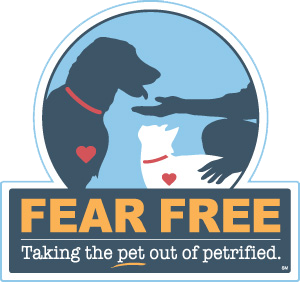First Aid Tips
If your pet is sick or injured and you feel he or she needs veterinary care call your regular veterinarian or the local veterinary emergency clinic immediately.
- Protect yourself and your pet from further injury. Pets that are frightened or in pain may bite; wrapping your pet in a blanket will keep him or her warm and prevent bite injuries to you.
- Car accidents can be extremely serious. Apply pressure to bleeding wounds, stabilize broken limbs, and seek veterinary care immediately. You can use a blanket or wooden board to act as a stretcher if necessary; place it on the ground behind your pet, then lift and pull the body first, legs trailing onto the blanket or board. Two people can lift the blanket or board with the animal on it into the car for transportation to the clinic. Even pets that can walk after an accident may have internal injuries and should be examined by a veterinarian.
- Applying pressure to a wound will help control the bleeding.
- If poisoning is suspected, bring the product packaging or bottle of pills with you. Treatment will be more effective if the toxin is identified.
- Torn nails need to be seen by a veterinarian; often the tear is more involved than it appears. On the other hand, if you have cut your pet’s nail too short while trimming it, apply baking soda or flour to the bleeding nail tip and some pressure to stop the bleeding.
- If your pet has been in a fight with another animal, check him or her carefully for bite wounds. If none are found watch your pet for other signs of injury. If wounds are found, seek veterinary care, small puncture wounds may be deeper than they initially appear.
- Diarrhea can be caused by many things, some more serious than others. Withhold food and give only water for the next 12 hours. If the diarrhea persists more than 12 hours or your pet becomes lethargic, weak or starts vomiting, contact your veterinarian or local emergency clinic, if your regular veterinary office is closed.
- Animals often consume things that may make them vomit. If your pet vomits once or twice, withhold food for 12 hours, give water in small, frequent amounts and keep him or her quiet. If the vomiting persists or is frequent, seek veterinary care immediately.
- Ear infections or skin rashes will cause your pet to scratch, rub the affected area on the ground or shake. Although generally not considered an emergency, if your pet is in enough discomfort, veterinary care should be sought immediately.
- Bloat is a serious and life threatening accumulation of gas in a dog’s stomach. Dogs experiencing this condition will have a distended abdomen, show signs of discomfort or pain, retch without vomiting, drool and possibly collapse. These dogs need veterinary care immediately.
- Seizures result from an electrical misfiring in the brain. They can be caused by many things including epilepsy, cancer, liver or kidney disease, infection or poisoning. One seizure should prompt you to make an appointment with your veterinarian, several seizures in a day or a seizure that does not stop should provoke you to seek veterinary care immediately.
- Stings and Snake bites will result in sudden acute pain with swelling. Ice applied to the swelling may reduce the pain and inflammation. If the swelling is on the face, the airway may be at risk, seek veterinary care.
- A choking pet will cough, gag or paw at its mouth. Try to open the mouth and remove the foreign body if you can, if not, seek veterinary care immediately.
- Eye injuries can vary in severity. Carefully examine the eye and rinse out any foreign objects with warm water. If the eye remains red and sore, have it examined by your veterinarian.
- Lower Urinary tract disease is common in pets. Usually the first symptom people will notice is that their pet is urinating more frequently and there may even be a hint of blood in the urine. These symptoms should prompt you to make an appointment with your regular veterinarian. If however, your pet is having trouble urinating, straining or vocalizing when he or she attempts to urinate, this is an emergency; contact your local veterinary hospital or emergency clinic immediately.








